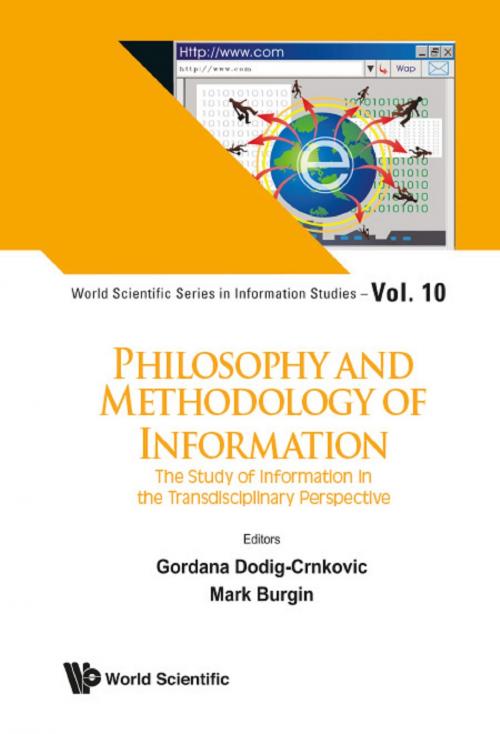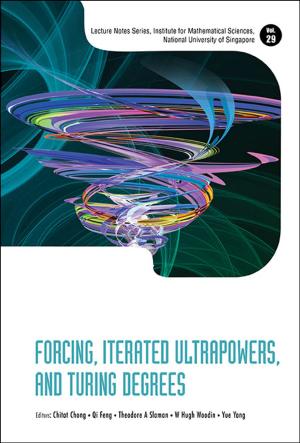Philosophy and Methodology of Information
The Study of Information in the Transdisciplinary Perspective
Nonfiction, Computers, Advanced Computing, Theory, Business & Finance, Industries & Professions, Information Management, Reference & Language, Reference| Author: | Gordana Dodig-Crnkovic, Mark Burgin | ISBN: | 9789813277533 |
| Publisher: | World Scientific Publishing Company | Publication: | April 22, 2019 |
| Imprint: | WSPC | Language: | English |
| Author: | Gordana Dodig-Crnkovic, Mark Burgin |
| ISBN: | 9789813277533 |
| Publisher: | World Scientific Publishing Company |
| Publication: | April 22, 2019 |
| Imprint: | WSPC |
| Language: | English |
The book gives up-to-date, multi-aspect exposition of the philosophy and methodology of information, and related areas within the nascent field of the study of information. It presents the most recent achievements, ideas and opinions of leading researchers in this domain, as well as from physicists, biologists and social scientists. Collaboration of researchers from different areas and fields opens new perspectives for the understanding of information essential in the innovative development of science, technology and society.
The book is meant for readers conducting research into any aspect of information, information society and information technology. The ideas presented give new insights for those who develop or implement scientific, technological or social applications. They are especially for those who are participating in setting the goals for science in general and sciences of information in particular.
Contents:
-
Introduction: The Study of Information in the Context of Knowledge Ecology (Gordana Dodig-Crnković and Mark Burgin)
-
Philosophy of information:
- Subject is No Object: Complementary Basis of Information (Piotr Bołtuć)
- Information and the Vision of Stephane Lupasco: Science, Logic and Philosophy (Joseph E Brenner)
- Information or Noise? (Terrence W Deacon)
- Reflections on the Concept of 'Objective Non-Reality' in Information Philosophy (En Wang)
- Rethinking Mencius Classical Debate on the Difference Between Humans and Animals Based on the Philosophy of Information (Lu Wang)
- Philosophy of Information — Radical Changing Force of Philosophy (Kun Wu and Ping Wang)
- In the Light of Shadows: Tracing an Information Profile (Rossella Lupacchini)
- The Philosophy of Information as an Ethical Application of Social Epistemology: Informational Ontogenesis and Philosophical-Symbolic Dilemmas (Gustavo Silva Saldanha, Vinício Souza de Menezes and Rodrigo Porto Bozzetti)
-
Methodology of Information:
- Information-Oriented Analysis of Discovery and Invention in Mathematics (Mark Burgin)
- Evolutive Information in the Anthropocene Era (Rodolfo A Fiorini)
- Computationalism in a Dynamic and Distributed Eco-cognitive Perspective (Lorenzo Magnani)
- Theoretical Study of the Concepts of Information Defined as Difference and as Identification of a Variety (Marcin J Schroeder)
- Factors Space and Mechanism-Based Artificial Intelligence Theory (Peizhuang Wang)
- Beyond Metaphorization: A Blochian View on Chaos and Fractality (Rainer E Zimmermann and Zhang Xiaomeng)
-
Philosophy of the Study of Information:
- The Situated Nature of Informational Ontologies (Jordi Vallverdú)
- Information-Oriented Analysis of Discovery and Invention in Mathematics (Mark Burgin)
- Discussion on the Necessity of Integrating Information Philosophy and Unified Information Science from the Perspective of Thomas Kuhn's Paradigm Theory (Zhensong Wang)
- Research on the Modernity of Confucianism from the Perspective of Philosophy of Information (Jun Liu)
-
Methodology of Information Studies:
- Can Cybersemiotics Solve the Problem of Informational Transdisciplinarity? (Søren Brier)
- Ten Principles of Information Science (Pedro C Marijuán and Jorge Navarro)
- Knowledge Structures and Conceptual Networks for Evaluation of Knowledge Integration (José María Díaz-Nafría, Mark Burgin and Blanca Rodriguez-Bravo)
- Universal Logics for Intelligent Information Processing (H C He, Y Q Zhou and Z C Chen)
- Information Ecology and Cognitive Justice: Core Value and Methodological Principles of Information Ecology (O Kang)
- Information Ecology: The Methodology for Information Studies (Y X Zhong)
-
Index
Readership: Graduate students and researchers in Information Theory.
Key Features:
- It covers the broadest range of phenomena related to information with their structures and processes as well as meta-level investigation of the nature of the study of information including its philosophy and methodologies
- It provides the context and the substrate for the research fields such as Philosophy of Information, Information Studies, and Information Science developing information perspective on natural sciences, cognitive, social and ecological studies
- It builds the foundation for further studies into information phenomena and their dynamics that will increase in the future society as a whole. In particular it is relevant for understanding of technological developments and scientific progress, which becomes increasingly digitalized, that is, information-based
The book gives up-to-date, multi-aspect exposition of the philosophy and methodology of information, and related areas within the nascent field of the study of information. It presents the most recent achievements, ideas and opinions of leading researchers in this domain, as well as from physicists, biologists and social scientists. Collaboration of researchers from different areas and fields opens new perspectives for the understanding of information essential in the innovative development of science, technology and society.
The book is meant for readers conducting research into any aspect of information, information society and information technology. The ideas presented give new insights for those who develop or implement scientific, technological or social applications. They are especially for those who are participating in setting the goals for science in general and sciences of information in particular.
Contents:
-
Introduction: The Study of Information in the Context of Knowledge Ecology (Gordana Dodig-Crnković and Mark Burgin)
-
Philosophy of information:
- Subject is No Object: Complementary Basis of Information (Piotr Bołtuć)
- Information and the Vision of Stephane Lupasco: Science, Logic and Philosophy (Joseph E Brenner)
- Information or Noise? (Terrence W Deacon)
- Reflections on the Concept of 'Objective Non-Reality' in Information Philosophy (En Wang)
- Rethinking Mencius Classical Debate on the Difference Between Humans and Animals Based on the Philosophy of Information (Lu Wang)
- Philosophy of Information — Radical Changing Force of Philosophy (Kun Wu and Ping Wang)
- In the Light of Shadows: Tracing an Information Profile (Rossella Lupacchini)
- The Philosophy of Information as an Ethical Application of Social Epistemology: Informational Ontogenesis and Philosophical-Symbolic Dilemmas (Gustavo Silva Saldanha, Vinício Souza de Menezes and Rodrigo Porto Bozzetti)
-
Methodology of Information:
- Information-Oriented Analysis of Discovery and Invention in Mathematics (Mark Burgin)
- Evolutive Information in the Anthropocene Era (Rodolfo A Fiorini)
- Computationalism in a Dynamic and Distributed Eco-cognitive Perspective (Lorenzo Magnani)
- Theoretical Study of the Concepts of Information Defined as Difference and as Identification of a Variety (Marcin J Schroeder)
- Factors Space and Mechanism-Based Artificial Intelligence Theory (Peizhuang Wang)
- Beyond Metaphorization: A Blochian View on Chaos and Fractality (Rainer E Zimmermann and Zhang Xiaomeng)
-
Philosophy of the Study of Information:
- The Situated Nature of Informational Ontologies (Jordi Vallverdú)
- Information-Oriented Analysis of Discovery and Invention in Mathematics (Mark Burgin)
- Discussion on the Necessity of Integrating Information Philosophy and Unified Information Science from the Perspective of Thomas Kuhn's Paradigm Theory (Zhensong Wang)
- Research on the Modernity of Confucianism from the Perspective of Philosophy of Information (Jun Liu)
-
Methodology of Information Studies:
- Can Cybersemiotics Solve the Problem of Informational Transdisciplinarity? (Søren Brier)
- Ten Principles of Information Science (Pedro C Marijuán and Jorge Navarro)
- Knowledge Structures and Conceptual Networks for Evaluation of Knowledge Integration (José María Díaz-Nafría, Mark Burgin and Blanca Rodriguez-Bravo)
- Universal Logics for Intelligent Information Processing (H C He, Y Q Zhou and Z C Chen)
- Information Ecology and Cognitive Justice: Core Value and Methodological Principles of Information Ecology (O Kang)
- Information Ecology: The Methodology for Information Studies (Y X Zhong)
-
Index
Readership: Graduate students and researchers in Information Theory.
Key Features:
- It covers the broadest range of phenomena related to information with their structures and processes as well as meta-level investigation of the nature of the study of information including its philosophy and methodologies
- It provides the context and the substrate for the research fields such as Philosophy of Information, Information Studies, and Information Science developing information perspective on natural sciences, cognitive, social and ecological studies
- It builds the foundation for further studies into information phenomena and their dynamics that will increase in the future society as a whole. In particular it is relevant for understanding of technological developments and scientific progress, which becomes increasingly digitalized, that is, information-based















